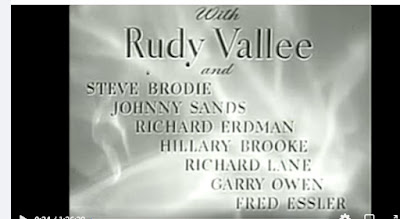Hollywood Rudy -- Garbo

If one plugs "Rudy Vallee" into the IMDb search box -- and who hasn't? -- a deceptively long list of films appears. Most are not appearances by Vallee himself, but list use of a recording for a soundtrack or even just a composer credit. Even when we do see Rudy onscreen, more often than not it's a song performance folded into the storyline, That's why I've included only three films in this week's post on Rudy Vallee in Hollywood. I've ranked them by my personal preference.
Technically there are four films today but I'm not counting this post-war piece of work:
The poster says it all.
My third-favorite (acceptable) film with Rudy in it is the 1967 film version of the Broadway hit musical "How to Succeed in Business without Really Trying." Rudy plays Jasper B. Biggley, a man getting up in years whose boss wants to fire him. Robert Morse (who went on decades later to play a large role in TV's "Mad Men" plays an ambitious window-washer who wants to make his way up the corporate lader, and he advocates for Biggley keeping his job.
In this duet Robert Morse and Rudy famously start by shouting "Groundhog! Groundhog!"
My second-favorite movie with Rudy was made twenty years earlier than "How to Succeed." In "The Bachelor and the Bobby-Soxer" (1947), Rudy plays a colleague of a professor played by Cary Grant. Some of the best moments in the film involve the semi-friendly rivalry between the men.
Rudy's also funny in the full-ensemble table scene near the end of the film. All the comic misunderstandings, confusion, and stress come tumbling out -- literally, for one unlucky character.
No surprise here for Vallee fans: My favorite film with Rudy Vallee in it is also the popular favorite, "The Palm Beach Story." Everyone who's seen it remembers the running gag involving Rudy's wire-rim eyeglasses. As mentioned earlier in this post, Rudy's name is in many soundtrack credits, and at the end of "The Palm Beach Story," he sings "Goodnight Sweetheart," for which he got co-writing credit. Because the tender melody happens at the end of a romantic comedy, the song of course brings back together the couple who've spent the whole movie on the brink of divorce.
So, Rudy Vallee in Hollywood... Was he a jug-eared comic actor or a handsome singing matinee idol? You decide.
Next week: A blog post about someone other than Rudy Vallee!
Garbo









Comments
Post a Comment